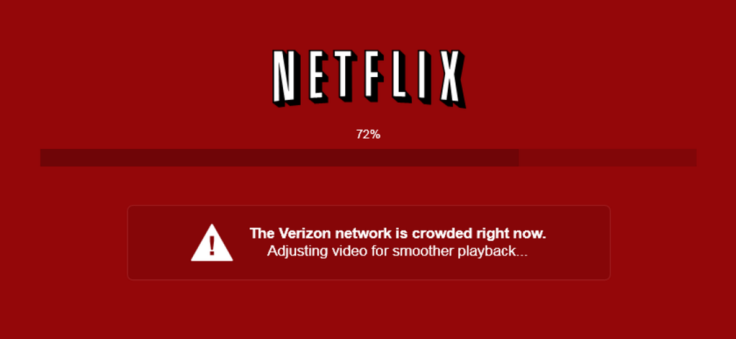Netflix Streaming Speed: Customers Testing to See Who Is To Blame For Slow Buffering, Poor Video Quality

Nothing is more frustrating after a long day at work than flopping onto a comfy couch and firing up Netflix (NASDAQ:NFLX) or Hulu only to have your favorite movie freeze, sometimes at the best part, due to a slow Internet connection.
The problem has only gotten worse for many of the more than 30 million Netflix subscribers (and 6 million Hulu subscribers) in the U.S. since a federal court struck down the Federal Communications Commission’s net neutrality laws, which said Internet service providers must treat all Internet traffic equally. Tension between Netflix and top ISPs has made headlines of late after Netflix began displaying a notification while videos buffer, explaining that overcrowded Verizon networks are to blame for the slow loading times.
Comcast (NASDAQ:CMCSA) and Verizon (NYSE:VZ) have accused Netflix of intentionally slowing down its own Internet speed by rerouting traffic, while the streaming company has said the ISPs are the ones making it harder to watch shows like “House of Cards” and “Orange Is The New Black.” Customers are now starting to feel the impact of all the corporate bickering, with angry subscribers convincing the FCC to investigate whether the ISPs really are, in fact, trying to stifle competition.
FCC Chairman Tom Wheeler, a former venture capitalist and lobbyist for the cable and wireless industry, said in a statement this week that – by and large – the top ISPs are delivering the Internet speeds they promise.
“Consumers deserve to get what they pay for,” he said in a statement, adding that a number of smaller DSLs have failed to live up to customers’ expectations. “To be clear, what we are doing right now is collecting information, not regulating. We are looking under the hood. Customers want transparency. They want answers. And so do I.”
What the chairman did not mention was that many customers have already started looking for the answers on their own. Testing their own Internet speed, many Netflix users have found that they exist in a kind of gray area between the ideal service and not being able to load their programs. The company’s Internet speed recommendations are reproduced here:
0.5 Megabits per second - Required broadband connection speed
1.5 Megabits per second - Recommended broadband connection speed
3.0 Megabits per second - Recommended for SD quality
5.0 Megabits per second - Recommended for HD quality
25 Megabits per second - Recommended for Ultra HD 4K quality
It’s relatively easy for any customer to calculate their own connection and record if it changes as the debate in Washington develops. Once logged into his or her account, the user simply needs to type “Example Short 23.976” in the search bar.
The short video displays the data rate and resolution quality as it plays, explaining that someone’s service could fall short if the ISP service is lower than the standard 3.0 Mbps. By shifting the quality of the video as it plays, “Example Short 23.976” is a reminder that video clarity is also a product of the connection, not just the buffer time.
Netflix’s own speed index for May 2014 claims that the highest speed in the U.S. was the 3.03 Mbps afforded to Cablevision customers. The lowest, according to company numbers, was the 1.05 Mbps that Verizon DSL customers were forced to endure. The numbers, if not tainted by the company’s position on the net neutrality debate, indicate that even in the best of circumstances a customer could have difficulty watching Frank Underwood’s scheming in HD.
© Copyright IBTimes 2024. All rights reserved.





















